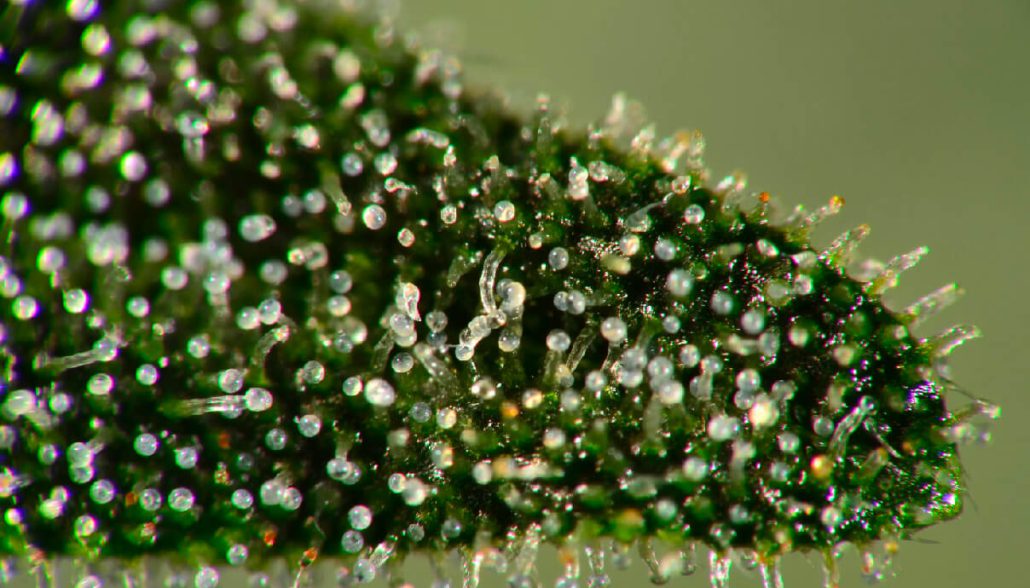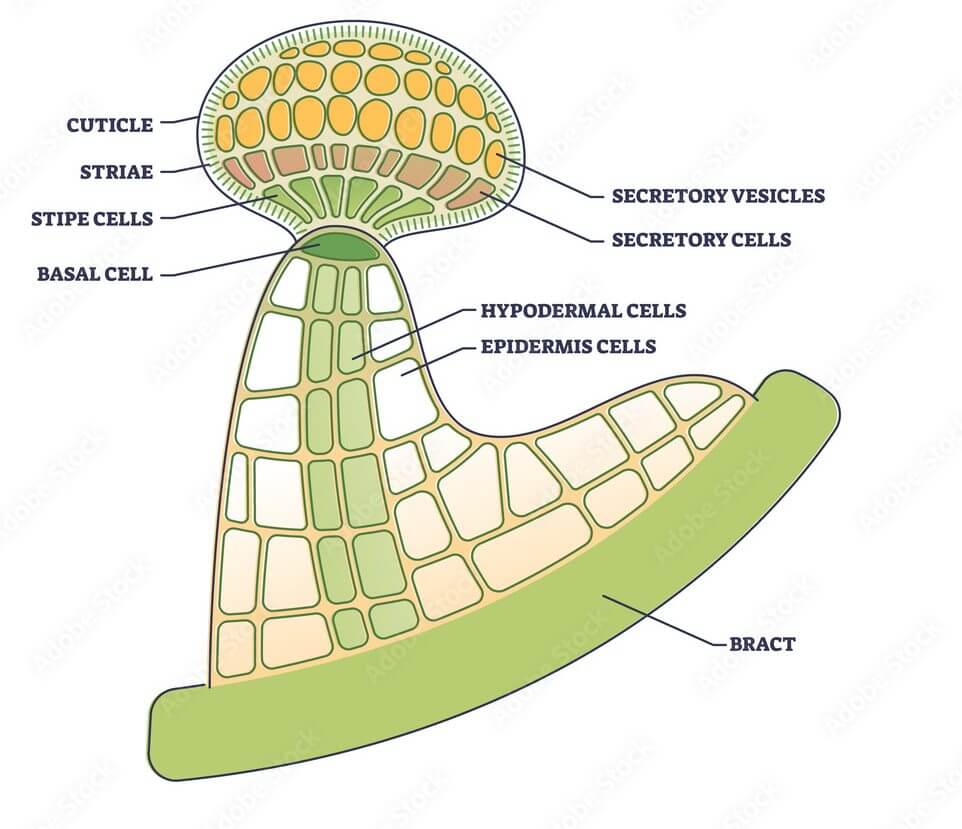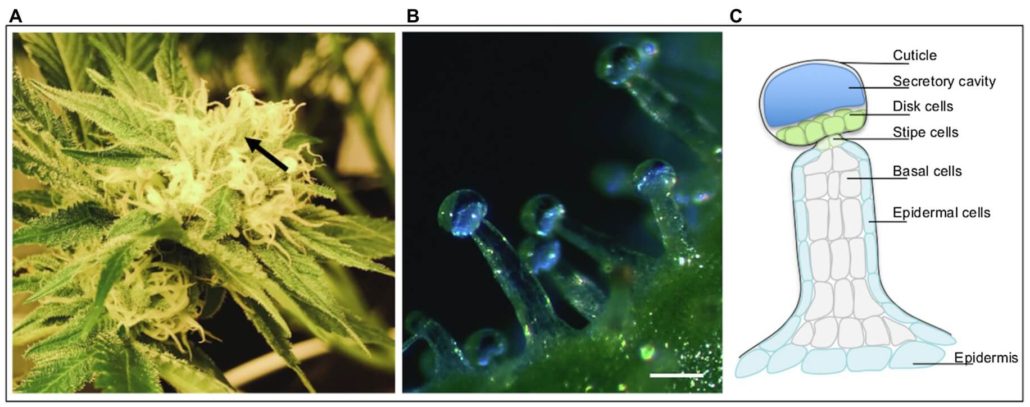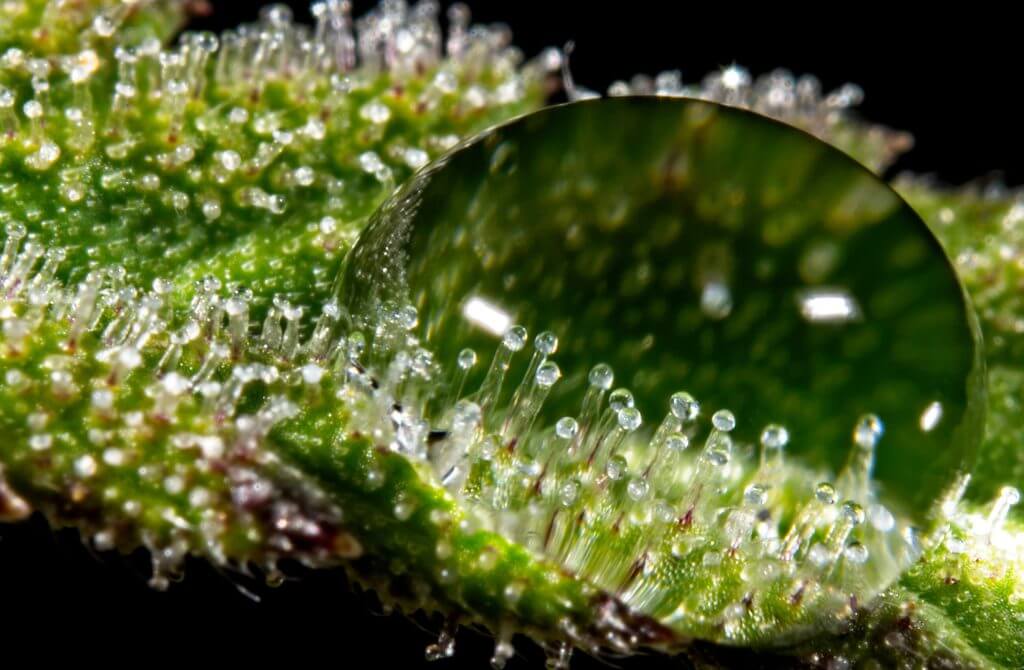Have you ever been captivated by the shimmering beauty of cannabis?
Those glistening trichomes are the unsung heroes behind the allure of cannabis, small yet powerful growths that harbor the plant’s most coveted compounds like THC and CBD.
Embark on a journey with us as we delve into the enigmatic world of trichomes. From their lifecycle to cultivation techniques aimed at maximizing their potential, we’ll uncover how these tiny factories enhance the cannabis experience, infusing each strain with distinct richness and complexity.
What Exactly Are Trichomes?

Image Source: GrowDiaries
Trichomes are minuscule outgrowths primarily found on cannabis flowers and leaves. Beyond mere adornments, these glandular structures act as the plant’s artisans, transforming sunlight and raw materials into cannabinoids like THC and CBD, as well as terpenes that define a strain’s effects, aromas, and medicinal properties.
These aromatic oils not only give each strain its unique scent but also play a pivotal role in augmenting the cannabinoids’ interactions with our bodies, contributing to what is known as the entourage effect. The density and maturity of trichomes serve as reliable indicators of a strain’s potency and overall quality, guiding cultivators and consumers alike in their pursuit of the perfect cannabis experience.
Decoding Trichome Anatomy: Types and Functions

Image Source: Adobe Stock
Trichomes come in various shapes and sizes, ranging from barely noticeable protrusions to elaborate glandular heads.
While some trichomes persist throughout the plant’s lifecycle, others may shed prematurely in response to environmental conditions.
There are three primary types of trichomes found on cannabis plants, each with its distinct form and function:
Bulbous Trichomes
These tiny trichomes are invisible to the naked eye and contribute less to the plant’s chemical composition, although they lend cannabis its sparkling appearance and sticky texture.
Capitate-Sessile Trichomes
Slightly larger and sporting a mushroom-like head, these trichomes begin synthesizing cannabinoids and terpenes, the compounds responsible for the plant’s effects and aroma. While they are primarily found beneath the leaves and require magnification to be seen, some of these trichomes transition into the next type as the plant matures.
Capitate-Stalked Trichomes
Visible to the naked eye, these trichomes resemble miniature mushrooms with a stalk and bulbous head. Predominantly located on the flowers, they are the primary producers of cannabinoids and terpenes, playing a crucial role in determining the plant’s potency and the diverse scents and flavors associated with different strains.
Trichomes in Cultivation: Nurturing Nature’s Artistry

Image Source: Frontiers
Life Cycle
During the vegetative phase, which lasts 2 to 12 weeks, cannabis plants focus on growth, laying down the structural foundation with minimal trichome development. However, as they transition to the flowering stage, trichomes undergo a transformative process.
The color change of trichomes serves as a vital indicator for growers to identify the optimal harvest time, ensuring a balance of desired effects and flavors. Different trichome colors signify varying stages of development:
Clear Trichomes
Transparent trichomes indicate ongoing resin production but lack sufficient cannabinoid concentration for desired potency. Harvesting at this stage may not yield the full spectrum of effects.
Cloudy Trichomes
Cloudy trichomes signify peak cannabinoid levels, indicating an optimal harvesting window for maximum potency. Harvesting at this stage is ideal for achieving a balanced effect.
Amber Trichomes
The transition to amber suggests a shift towards more sedative effects, desirable for certain cultivars. However, it also indicates THC degradation, emphasizing the importance of timing for preserving potency.
Mixed Trichomes
Hybrid strains present a blend of effects, with the ideal harvest time depending on the desired balance between cerebral and physical experiences.
Harvest Time: The Trichome Touchstone
Harvesting cannabis is intricately linked to trichome observation. Clear trichomes indicate underdevelopment, while milky trichomes suggest peak potency with more cerebral effects. Amber trichomes lean towards sedative qualities or signal possible cannabinoid degradation.
Choosing the right moment to harvest depends on the desired effects, whether aiming for a lively, sativa-like experience or a profound, indica-driven calm.
Maximizing Potency: Cultivating Trichome Brilliance

Image Source: Sensi Seeds
Trichome production is influenced by environmental conditions such as temperature, humidity, light intensity, and nutrient availability. Creating optimal conditions can enhance trichome production:
Provide Adequate Lighting
Trichomes thrive in well-lit environments. High-quality grow lights that mimic sunlight spectrum encourage trichome growth and resin production.
Maintain Ideal Environment
During the flowering stage, maintain optimal conditions with humidity around 30-40% and temperatures near 26°C to support trichome and terpene development.
Implement Plant Training
Training techniques like low-stress and high-stress training help distribute hormones across the plant, promoting trichome production and resin-rich flowers.
Provide Nutrient Support
Phosphorus and potassium are crucial for trichome development during the flowering stage. Tailor nutrient mixtures to meet the specific needs of each strain for optimal trichome production.
Consider Strain Variability
Different strains have unique preferences for environmental conditions. Understanding and catering to these preferences can further enhance trichome production, ensuring each strain reaches its full potential.
In conclusion, trichomes are the unsung heroes behind cannabis’s brilliance, enriching each puff with potency and complexity. So, the next time you admire those sparkling crystals on cannabis, remember the intricate world of trichomes working tirelessly to enhance your experience. Cheers to trichomes, nature’s exquisite craftsmanship elevating cannabis to new heights.
